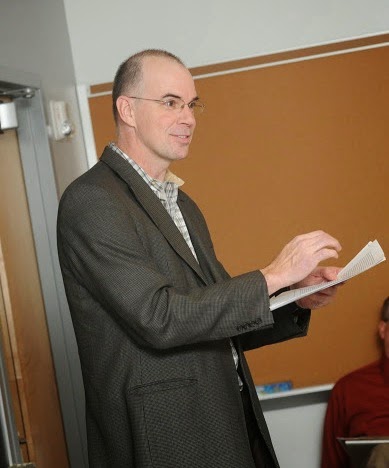 |
| Dr. William Vaughan |
The first workshop addressed the arguments of Husserl’s Fifth Cartesian Meditation, the distinctions between ‘static’ and ‘genetic’ phenomenology, and the historical reception of Husserl’s efforts. The second workshop detailed the phenomenology of intersubjectivity in reaction to Husserl through select works of major German and French thinkers Scheler, Heidegger, Sartre, Merleau-Ponty, and Levinas.
In the first workshop, Dr. Vaughan zeroed in on the unfortunate historical circumstances of Husserl’s career and publications that had led to misunderstandings of his views. An entire generation of both German and French thinkers had reacted to Husserl’s work Cartesian Meditations, wherein Husserl had seemingly argued that understanding and relating to others (known as intersubjectivity in this literature) could be taken only as sense-correlates of one’s own conscious processes. On this view, actual other human beings never condition the processes of this monadic ego; they are always only quasi-reproductions of oneself. However, subsequent scholarship and release of Husserl’s Gesammelte Werke (complete works) has shown that he had in fact developed a much more nuanced conception of intersubjectivity in his unpublished manuscripts.
“Husserl was not well served by historical circumstances,” said Vaughan. “We have 20 volumes of unpublished work that is probably superior to his published work. His publications were always out of joint with where his actual thinking was leading. He could have used a better book-agent.”
In the second workshop, Dr. Vaughan explicated both how famous thinkers reacted to and criticized Husserl, and also how they misunderstood Husserl. Rather than merely a ‘static’ phenomenology with a rigid structure that focuses on constitution by an already-constituted ego, Husserl had already developed a genetic phenomenology that addresses temporal phenomena, historical accumulation and community, features which he came to conclude were the actual features of human intersubjectivity. Later thinkers unfortunately came to identify Husserl with static phenomenology only, reinforcing the Cartesian framework that the subject or ego is absolute.
“Contemporary scholarship is correcting the historical record, but the existentialist bus had already left the station. These later classical phenomenologists thought they were articulating general features of the human condition, but in many respects we can now see some of their work as extensions of the debilitating cultural aspects of the world wars.”

No comments:
Post a Comment